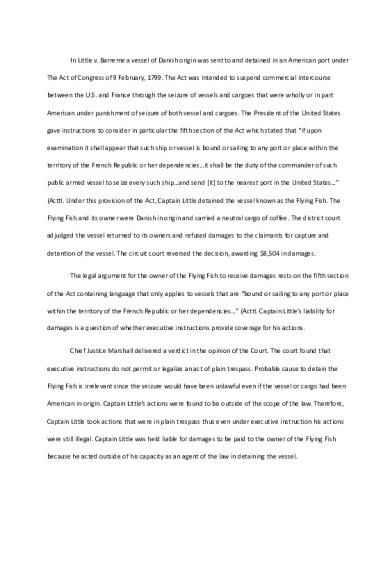Little v Barreme - Grade: B+ PDF

| Title | Little v Barreme - Grade: B+ |
|---|---|
| Course | Philosophy of Law |
| Institution | Kansas State University |
| Pages | 2 |
| File Size | 35.9 KB |
| File Type | |
| Total Downloads | 90 |
| Total Views | 170 |
Summary
Professor: Mahoney...
Description
In Little v. Barreme a vessel of Danish origin was sent to and detained in an American port under The Act of Congress of 9 February, 1799. The Act was intended to suspend commercial intercourse between the U.S. and France through the seizure of vessels and cargoes that were wholly or in part American under punishment of seizure of both vessel and cargoes. The President of the United States gave instructions to consider in particular the fifth section of the Act which stated that “if upon examination it shall appear that such ship or vessel is bound or sailing to any port or place within the territory of the French Republic or her dependencies…it shall be the duty of the commander of such public armed vessel to seize every such ship…and send [it] to the nearest port in the United States…” (Act). Under this provision of the Act, Captain Little detained the vessel known as the Flying Fish. The Flying Fish and its owner were Danish in origin and carried a neutral cargo of coffee. The district court adjudged the vessel returned to its owners and refused damages to the claimants for capture and detention of the vessel. The circuit court reversed the decision, awarding $8,504 in damages. The legal argument for the owner of the Flying Fish to receive damages rests on the fifth section of the Act containing language that only applies to vessels that are “bound or sailing to any port or place within the territory of the French Republic or her dependencies…” (Act). Captain Little’s liability for damages is a question of whether executive instructions provide coverage for his actions. Chief Justice Marshall delivered a verdict in the opinion of the Court. The court found that executive instructions do not permit or legalize an act of plain trespass. Probable cause to detain the Flying Fish is irrelevant since the seizure would have been unlawful even if the vessel or cargo had been American in origin. Captain Little’s actions were found to be outside of the scope of the law. Therefore, Captain Little took actions that were in plain trespass thus even under executive instruction his actions were still illegal. Captain Little was held liable for damages to be paid to the owner of the Flying Fish because he acted outside of his capacity as an agent of the law in detaining the vessel.
Chief Justice Marshall’s ruling is important because it limits the government’s liability in cases where an agent of the law takes actions that are outside of the scope of the law. One consequence of this limitation is that liability is transferred from the government to the agent of enforcement. This limitation means that when agents of enforcement take actions that are outside of the scope of the law then they are no longer protected by the establishment in which’s name the agent acts. Limitations of this nature allow a delineation between the agent acting as an enforcer of the law that is protected by the United States and the agent acting as an independent actor that is liable to the laws of the United States....
Similar Free PDFs

Little v Barreme - Grade: B+
- 2 Pages

Marbury v. Madison - Grade: B+
- 6 Pages

Marbury V. Madison - Grade: B+
- 4 Pages

Watson Little Albert - Grade: A
- 2 Pages

Engwr #4- B - Grade: B
- 7 Pages

Critical Analysis - Grade: B
- 6 Pages

Florida Consent - Grade: B
- 3 Pages

Oscilloscope Report - Grade: B+
- 4 Pages

Debut- Script - Grade: B+
- 6 Pages

Galanz - Grade: B+
- 10 Pages

Reflection 5 - Grade: b
- 1 Pages

Reconciliation - Grade: B-
- 5 Pages

Evicted Essay - Grade: B+
- 3 Pages

BẢN-CHUẨN - Grade: b
- 49 Pages

Alexia Miller - Grade: B
- 3 Pages
Popular Institutions
- Tinajero National High School - Annex
- Politeknik Caltex Riau
- Yokohama City University
- SGT University
- University of Al-Qadisiyah
- Divine Word College of Vigan
- Techniek College Rotterdam
- Universidade de Santiago
- Universiti Teknologi MARA Cawangan Johor Kampus Pasir Gudang
- Poltekkes Kemenkes Yogyakarta
- Baguio City National High School
- Colegio san marcos
- preparatoria uno
- Centro de Bachillerato Tecnológico Industrial y de Servicios No. 107
- Dalian Maritime University
- Quang Trung Secondary School
- Colegio Tecnológico en Informática
- Corporación Regional de Educación Superior
- Grupo CEDVA
- Dar Al Uloom University
- Centro de Estudios Preuniversitarios de la Universidad Nacional de Ingeniería
- 上智大学
- Aakash International School, Nuna Majara
- San Felipe Neri Catholic School
- Kang Chiao International School - New Taipei City
- Misamis Occidental National High School
- Institución Educativa Escuela Normal Juan Ladrilleros
- Kolehiyo ng Pantukan
- Batanes State College
- Instituto Continental
- Sekolah Menengah Kejuruan Kesehatan Kaltara (Tarakan)
- Colegio de La Inmaculada Concepcion - Cebu
